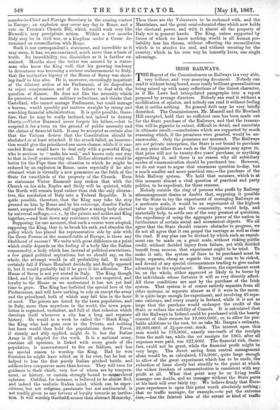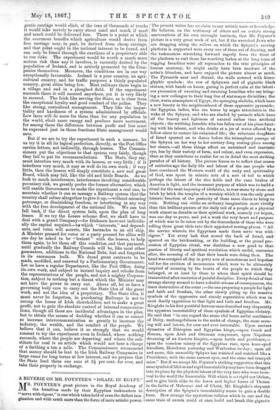IRISH RAILWAYS.
THE Report of the Commissioners on Railways is a very able, very tedious, and very annoying document. Nobody can read it without being bored, some really brilliant generalizations being mixed up with many reflections of the tiniest character, as if Mr. Lowe had interpolated paragraphs into a report prepared by average directors. Nobody can read it without a modification of opinion, and nobody can read it without feeling that it settles nothing. Its general drift may be very briefly described. The Commissioners, Mr. Monsell and Sir Rowland Hill excepted, hold that no sufficient case has been made out for the State purchase of the Railways, and that the transac- tion will be gigantic in extent, difficult in detail, and uncertain in ultimate result,—conclusions which are supported by much reasoning which, if the premisses were granted, would be un- answerable. Only the premisses are unsound. The Railways are not private enterprises, the State is not bound to purchase at any price other than such as the Companies may agree to, that price will not be twenty-five years' purchase, or anything approaching it, and there is no reason why all subsidiary modes of communication should be purchased too. However, we do not want to argue that enormous question to-day, but a much smaller and more practical one,—the purchase of the Irish Railway system. We hold that measure, which is at this moment almost a vital question of practical and party politics, to be expedient, for these reasons. Nobody outside the ring of persons who profit by Railway mismanagement denies or doubts that, supposing it possible for the State to try the experiment of managing Railways on a moderate scale, it would be an experiment of the highest value to politicians and the community, would help, and materially help, to settle one of the very greatest of questions, the expediency of using the aggregate power of the nation in furtherance of certain social and economical objects. We all agree that the State should remove obstacles to progress, we do not all agree that it can propel the carriage as well as clear the road. If any plan can be devised by.which such an experi- ment can be made on a great scale, without risking public credit, without decided injury from failure, yet with decided benefit from success, that experiment ought to be tried. To make it safe, the system of lines to be purchased must be large, separate, cheap as regards the total sum to be risked, and devoid of any special circumstances tending to give undue advantage to the experiment. Moreover, the experiment must be, on the whole, either approved or likely to be borne by the individuals whose fortunes it will so very directly affect. All these conditions are met by the purchase of the Irish system. That system is of course entirely separate from all other systems, as separate almost as if it were in the moon. It is quite large enough for experiment, and involving 46 sepa- rate railways, and every county in Ireland, while it is not so large that the purchase would endanger the credit of the State or reduce the solidity of Consols. It is calculated that all the Railways in Ireland could bei purchased with the hearty consent of their owners for 19,000,0001., or, to allow for pro- bable additions to the cost, let us take Mr. Dargan's estimate, 22,000,0001. of 3fr-per-cent. stock. The interest upon this sum would be 770,0001., exactly one-tenth of the receipts from the malt tax, while the net receipts for 1865, after all expenses were paid, was 927,0001. The financial risk, there- fore, could not be great, while the financial profit might be very large. The direct saving from central management alone would be, as calculated, 170,0001., quite large enough to allow of the great experiment which has to be made, the reduction of fares slowly but steadily to the point at which the widest freedom of communication is consistent with any profit at all. What that point may be no -living. traffic manager can decide, and no manager without the State'purse at his back will ever fairly try. We believe firmly that Euro- pean experience is upon this point worth absolutely nothing ; that no traffic manager, for example,—to put the- extreme ease,—has the faintest idea, of the extent or kind of traffic gratis carriage would, elicit, of the tens of thousands of trucks it would take merely to carry about marl and muck, if marl and muck could be delivered free. There is a point at which the enormous benefits which agriculture would derive from free carriage may, in part, be derived from cheap carriage, and that point ought in the national interest to be found, and can only be found through the exertions of a proprietary able to run risks. The experiment would be worth a much more serious risk than'any it involves, is earnestly desired by the population of Ireland, and is actively promoted by the Com- panies themselves. Moreover, the conditions are in one way exceptionally favourable. Ireland is a poor country, an agri- cultural country, and for traffic purposes a thinly populated country, great cities being few. Most railways there begin in a village and end in a ploughed field. If the experiment succeeds there it will succeed anywhere, yet it is very likely to succeed. The Irish like serving the State, as is clear from the exceptional loyalty and good conduct of the police. They like strong, centralized management. They like the impar- tiality and harshness of a system administered by officials. Low fares will do more for them than. for any population in the world, elicit more energy and produce more movement, for among them the difference between profit and loss must be expressed just in those fractions State management would save.
But if we are to try the experiment in such a manner, let us try it in all its logical perfection, directly, as the Post Office carries letters, not indirectly, through lessees. The Commis- sioners put the objections to that system very fairly, though they fail to put its recommendations. The State, they say, must interfere very much with its lessees, or very little ; if it interferes very much, it may as well do its own work ; if very little, then the lessees will simply constitute a new and great Board, which may fail, like the old and little Boards. As we look to much interference, interference involving considerable pecuniary risk, we greatly prefer the former alternative, which will enable Government to make the experiment a real one, to ascertain whether it can so manage a Railway system that the country shall refuse altogether to give it up,—without misusing patronage, or diminishing freedom, or interfering in any way with the free development of the national life. We can but fall back, if the direct system fails, upon the plan of long leases. If we try the Lessee scheme first, we shall have to deal with,a grand Company—for Irishmen have not individu- ally the capital required—tot which "interests," and depend- ants, and votes will accrete, like barnacles to an old ship. A Minister pressed-for.votes or a party pressed for allies will one day be asked to be lenient ' with the lessees, to help them again, to let them off this condition and that payment, until gradually the Railway Consols will be, like most other guarantees, additions to the National Debt, lost and forgotten in its enormous bulk. We dread great contracts to be made, modified, and renewed by a Parliamentary Government. Let us have a regular Department, like the Post Office, doing its own work, and subject to instant inquiry and rebuke from the representatives of the people, and not a mighty Corpora- tion, subject to nothing but a threat which the Minister may not have the power to carry out. Above all, let us have a governing body sure to carry out the State idea of the great work, and not the idea of a proprietary. The State idea, it must never be forgotten, in purchasing Railways is not to recoup the losses of Irish shareholders, not to make a great profit, not to gain the absolute control of internal communica- tions, though all these are incidental advantages in the plan, but to obtain the means of deciding whether it can or cannot so increase intercommunication as greatly to increase the industry, the wealth, and the comfort of the people. We believe that it can, believe it so strongly that we would consent to try the experiment even in Ireland, where nothing succeeds, where the people are departing, and where the sub- stitute for coal is an article which would not bear a charge of a farthing a ton a mile. The Commissioners recommend that money should be lent to the Irish Railway Companies in large sums for long terms at low interest, and we propose that the State lend them one sum at 3 per cent. for ever, and take their property in exchange.































 Previous page
Previous page